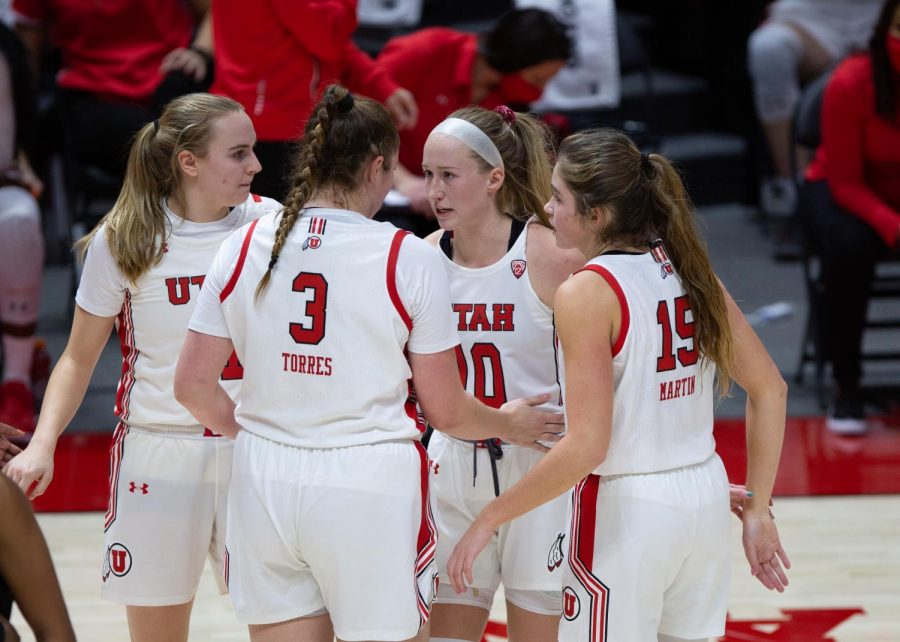The Identity Of Utah Women’s Basketball: Growth
University of Utah women’s basketball player, Dru Gylten (#10), talks to teammates Andrea Torres (#3), Kemery Martin (#15), and Brynna Maxwell (#11), in the game against Arizona State University in the Jon M. Huntsman center in Salt Lake City on Dec. 18, 2020. (Photo by Jack Gambassi | The Daily Utah Chronicle)
February 16, 2021
Disclaimer: The stats referenced in this article are up to date as of Feb. 1, 2021 pre the NorCal series.
The Utah Utes are 4-10 halfway through the Pac-12 women’s basketball season, a record which no one within the program is thrilled with, but there are positive signs for the future.
For example, Utah’s underclassmen (freshman and sophomore players, of which there are seven) have scored 69% of the team’s points this season. Those 7 players are all expected to return next year.
One such player is Kemery Martín. Martín has averaged 10.9 points per game this season, the second-most on the team. Martín’s game can best be described as that of a gunslinger, a wild west outlaw, run and gun. Head coach Lynne Roberts attributes Martín’s growth to that newfound swagger.
“She’s improved in every aspect of the game, but the foundation of everything is confidence. Confidence is a powerful thing in basketball, I think it’s the biggest thing in basketball. Players that are confident shoot a higher percentage, defend harder, run faster, they talk more — you just see it,” Roberts said.
The confidence in Martín’s game is clear in the way she plays. One play, in particular, this season sticks out against one of the Arizona schools at home. Martín fired a full cross-court pass diagonally to the corner for Andrea Torres, who drained the open three. That is the sort of confidence coach Roberts references — the fearlessness to take the game into her own hands.
It hasn’t just been Martín, though. Coach Roberts also has high praise for Dru Gylten, calling her one of the team’s most consistent players.
Gylten is averaging 8 points, 5.5 assists, and 3.1 rebounds per game. Those numbers stick out, especially considering that the Utes play at their best when playing assist basketball. The team is averaging 11.9 assists per game, and Roberts says that when they pass the ball, the Utes are at their best.
“We can score when we are playing assist basketball,” Roberts said.
The Utes have a bit of trouble scoring sometimes. The team averages 64 points per game, which, while not awful, doesn’t compare to the top teams in the conference. What is more concerning is that the Utes don’t shoot the three-ball particularly well.
This is an issue because that has been the team’s identity for most of the season, though in recent weeks the percentage numbers have gone up while the frequency of the three-point shot has come down. The Utes currently shoot 32% from three-point range. That puts them in the middle of the table in the Pac-12 as the sixth-best three-point shooting team in the conference.
What the Utes have been good at is defense. Utah ranks fourth in the Pac-12 in total steals (120) and sixth in total blocks (58), ranking in the top 60 nationally in both, via a press release from Utah Athletics. The effort shows. The team has momentary lapses and has struggled this year with giving up runs, but aside from one bad outing against UCLA, the defensive effort has been good.
Part of that is freshman Peyton McFarland. A 6’4 defensive monster with a WNBA body type who leads the team with 15 blocked shots, McFarland has also posted 55 rebounds this year. The Utes have been a good rebounding team, averaging about 35 boards per game.
Opponents, however, average one more rebound per game against the Utes at 36. Aside from two games, rebounding has never been the issue of why the Utes lost the game.
The main problem for Utah is turnovers.
“Can you see the grey in my hair?” Roberts said, referencing her frustration with turnovers. “It’s been a constant thing and we talk about it. But yeah, it’s been an ongoing thing and until we fix that, you know, for us to beat Oregon or Oregon State or USC, I don’t see how we are going to beat those teams with that happening.”
The Utes have turned the ball over an average of 19 times per game, the second-most in the Pac-12. Roberts attributes most of those turnovers to trying to do too much. When a pass is supposed to go to player x, the Utes try to get fancy and go-to player y, according to Roberts.
Roberts was blunt when asked about the turnover problem.
“A lot of these turnovers are self-inflicted, where you shoot yourself in the foot. If they want to keep shooting themselves in the foot, then be content with losing,” Roberts said.
Interestingly, Roberts doesn’t really know the identity of her basketball team yet. No one really does. The Utes are simply growing, something new happens every game — whether it be a new problem or a new solution. The COVID-19 season is to blame for that.
“I don’t know what our identity is. It’s a hard question for me right now with this group,” Roberts said.
Coach Roberts went onto add that COVID-19 has made this season spectacularly difficult, though she also said that the Utes have taken real positive steps forward in thinning their rotations to the players that make the most sense for the team.
One such player is Niyah Becker, who has seen much more playing time over the past few weeks. Becker averages 6.6 points per game but makes her money on the boards, averaging 4 rebounds per tilt. She is a tough, physical player who has tremendous defensive skill.
Brynna Maxwell, last year’s star player, has also found herself settling into her role. The first seven games of the year were a tough patch for Maxwell as she faced a more physical defensive game than she was used to. She has settled in though, scoring 27 points in her latest outing against the Oregon State Beavers. Maxwell leads the team in scoring, averaging 13.6 per game.
The Utes are young. It takes time for teams to develop and though the goal, according to Roberts, is to “win every game,” that has already fallen by the wayside with a loss to Oregon State. The team is focused on 2021 and the current season, but fans should look ahead to next year — a year that should be filled with high expectations, an experienced team and a quest for a winning season.
That said, come March and the Pac-12 tournament, it is not out of the realm of possibility that the Utes get hot and make a run. Though they will need to use these remaining games to continue to get better, limit turnovers, and learn how to string together wins.












